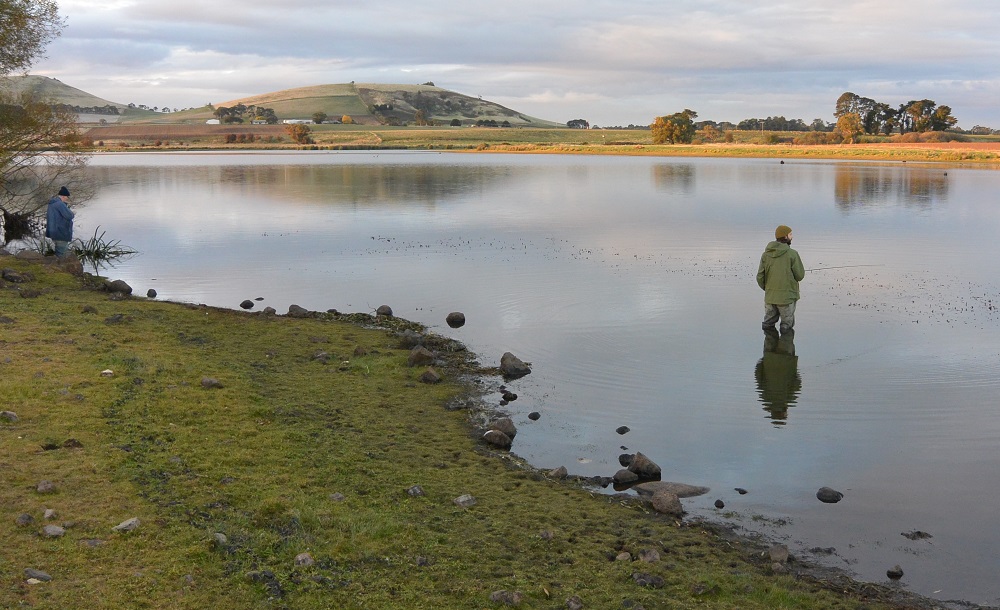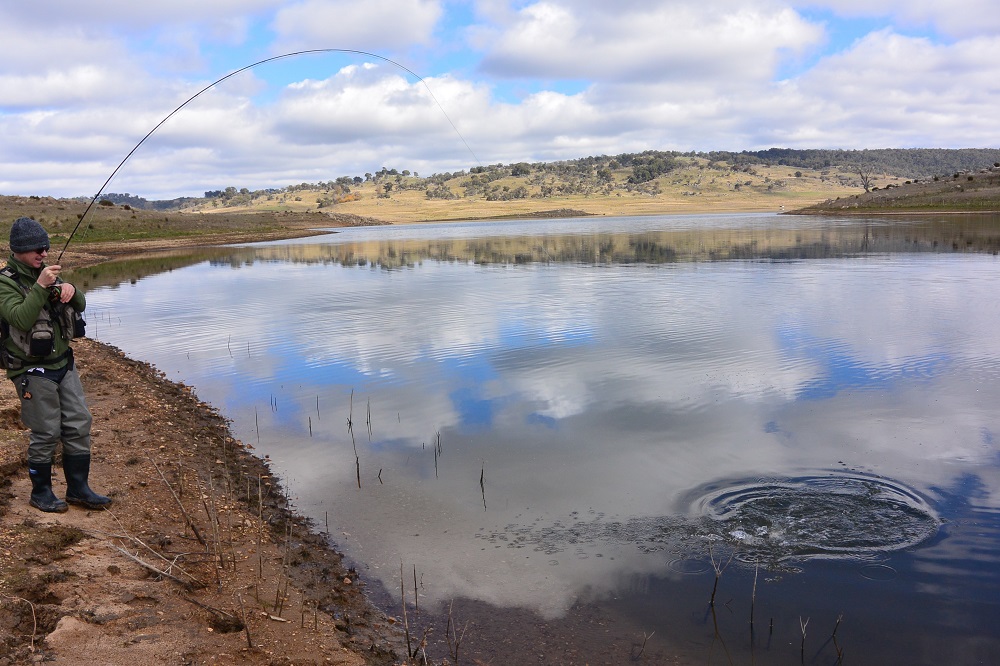
While I might make light-hearted references to bananas and fishing gods, I understand there are logical reasons behind fishing outcomes, even if the detail is sometimes elusive. If you have reasonable fish stocks (the fish actually being present in the first place), add the right water and weather conditions, apply the right flies and techniques, then success should follow. Conversely, remove anything from that list, and the catching is going to suffer. Logic and science win through, and the world is a tidy place.
Except there’s a bothersome exception to the above, and it’s when two anglers of similar ability are apparently doing the same thing, in the same place, but one is catching fish and the other isn’t. It’s not a common occurrence, but it’s happened often enough over my fishing life – both as the one doing the catching and as the one missing out – to make me wonder what’s going on.
 Two equally competent anglers; one is about to catch a good fish and one will miss out. Why is that?
Two equally competent anglers; one is about to catch a good fish and one will miss out. Why is that?In the most recent case, Peter and I were fishing a central Victorian lake on a day when all the positive factors on the checklist were ticked off. Sure enough, we arrived at the first bay to find three trout smelting. Now, often on these waters, a trout or two each is an acceptable daily catch rate. That’s not many compared to the numbers of fish caught on a typical stream fishing day, but the trade-off is, the trout are usually large.
From such a low base, it’s common enough for one of us to catch a couple of nice trout, while the other catches only one, or even misses out. With relatively few chances to begin with, statistics make it unlikely that two similarly capable anglers will catch exactly the same number of fish. Nothing spooky about that.
But then, on the day with Peter, I caught four and dropped (as in had on but lost) another three. So that’s seven fish I had on the line. During the same period, my mate had one touch. While outscoring your mate is fun up to a point, it got to the stage where I was literally giving Peter the fly I’d just caught a fish on. We both knew it was unlikely this was the difference, but we needed to remove as many variables as possible.
Now, it would be tempting to put the hook-up rate that day down to skill, but Peter and I have been fishing together since we were kids, and he as much as anyone taught me to flyfish. You can rest assured that the exact opposite situation has occurred over the decades – I’m recalling in particular some river nymphing situations where I copied Peter fastidiously, virtually standing beside him, yet I couldn’t come close to his catch.
So what’s going on? The simplest and most rational explanation, is that confidence is converted into extra effort and attention to detail on behalf of the successful angler. I’d like to be convinced of that, I really would, and maybe I could be if the catch ratio of a couple of similarly competent anglers was, say, two to one. But when it’s several to one… or, heaven forbid, none? Well, I’m having trouble selling the explanation to me, let alone you.
Which leaves us with something happening which is beyond regular science and logic; not quite paranormal perhaps, but certainly extranormal. Could it be that the angler on a fish-catching roll, is somehow responding to cues which are not consciously perceivable. For example, is their subconscious noting a drop-off or weed-bed edge, coupled with, say, a certain light intensity, wind direction, temperature, etc. which accumulated memory recognises as worth extra effort? Though if you asked that angler why they are giving spot X 10 minutes instead of 5, they might honestly say they don’t know. Or they might not even be aware they were giving it extra time – until it was pointed out.
There are so many things I find fascinating and captivating about flyfishing, and maybe this is another to add to the list: when we’re on the water, and completely free of distraction, we are capable of accessing a vault of subtle but valuable information, which we’re not even outwardly aware of.
 Steve may have forgotten this day, but I haven't! He caught some of the best Eucumbene rainbows I've ever seen from this bay, while I didn't get a touch. Did his subconscious knowledge bank play a part?
Steve may have forgotten this day, but I haven't! He caught some of the best Eucumbene rainbows I've ever seen from this bay, while I didn't get a touch. Did his subconscious knowledge bank play a part?If we suppose for a moment that I’m on to something, then as soon as the angler who isn’t catching becomes aware of the imbalance, the cause is most likely lost. They will start scrambling for an overt change – in fly, technique, spot, etc. – to catch up. And once that happens, the almost meditative state necessary to access the vault, so to speak, will be gone. The gap will only get worse, and we end up with the equally capable, but now flustered and frustrated angler, falling further and further behind. The successful angler may genuinely try to help, but that probably only makes matters worse.
(By the way, late in the day, Peter wandered off by himself for an hour, changed to an untried fly, and caught a 5 pound brown.)











